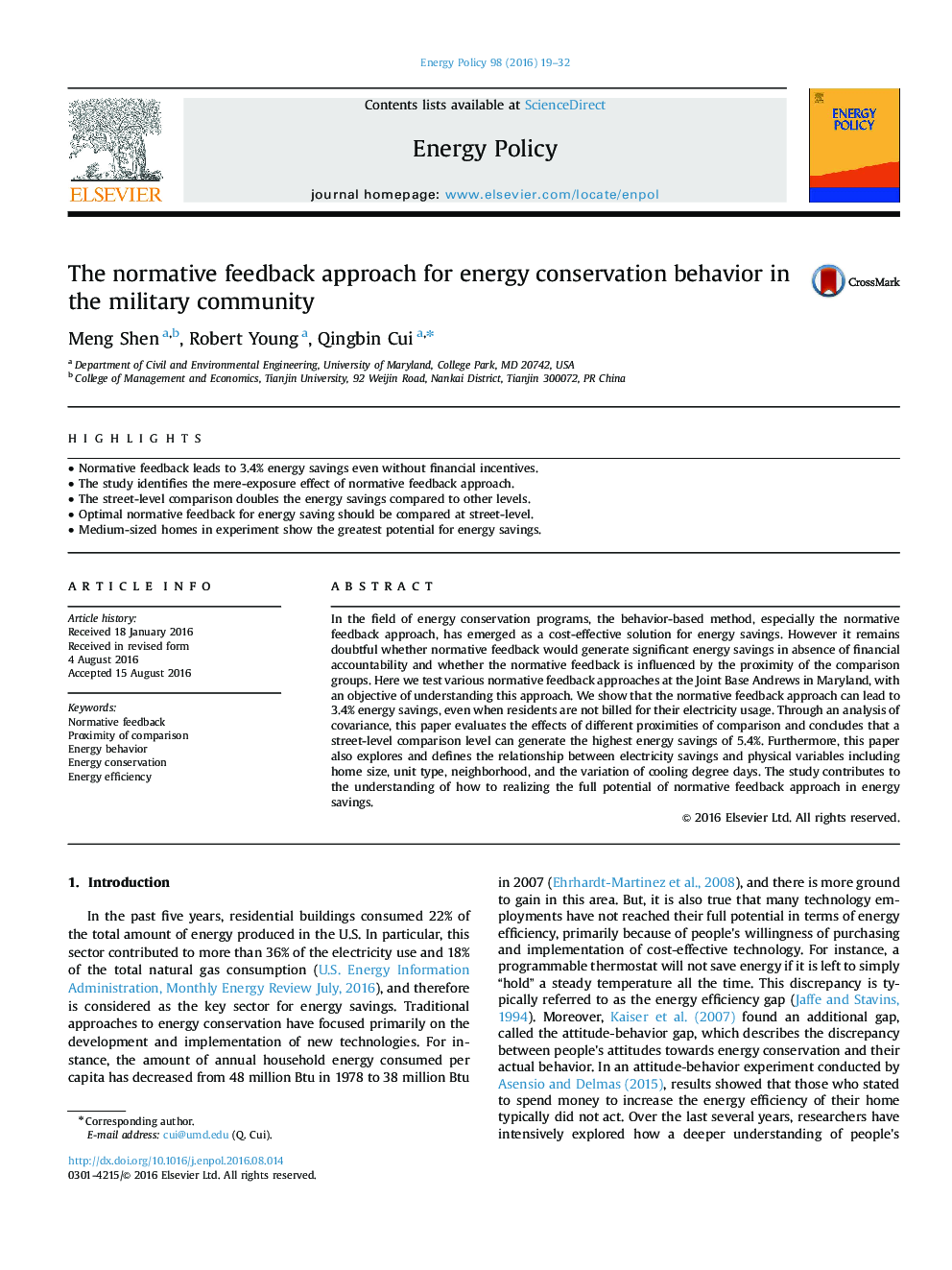| کد مقاله | کد نشریه | سال انتشار | مقاله انگلیسی | نسخه تمام متن |
|---|---|---|---|---|
| 7398358 | 1481260 | 2016 | 14 صفحه PDF | دانلود رایگان |
عنوان انگلیسی مقاله ISI
The normative feedback approach for energy conservation behavior in the military community
ترجمه فارسی عنوان
روش بازخورد هنجاری برای رفتار حفاظت از انرژی در جامعه نظامی
دانلود مقاله + سفارش ترجمه
دانلود مقاله ISI انگلیسی
رایگان برای ایرانیان
کلمات کلیدی
ترجمه چکیده
در زمینه برنامه های حفاظت از انرژی، روش مبتنی بر رفتار، به ویژه رویکرد بازخورد هنجاری، به عنوان یک راه حل مقرون به صرفه برای صرفه جویی در انرژی پدید آمده است. با این وجود هنوز نگرانی وجود دارد که آیا بازخورد هنجاری موجب صرفه جویی در انرژی قابل توجهی در عدم پاسخگویی مالی خواهد شد یا اینکه بازخورد هنجاری تحت تأثیر تقریبی گروه مقایسه قرار می گیرد. در اینجا ما روشهای بازخورد هنجاریابی را در پایگاه اصلی اندروز در مریلند تست می کنیم، با هدف درک این رویکرد. ما نشان می دهیم که روش بازخورد هنجاری می تواند به صرفه جویی در انرژی 3.4٪ منجر شود، حتی زمانی که ساکنین برای مصرف برق خود را به حساب نمی آورند. از طریق تجزیه و تحلیل کوواریانس، این مقاله اثرات تقریب های مختلف مقایسه را ارزیابی می کند و نتیجه می گیرد که سطح مقایسه سطح در خیابان می تواند بیشترین میزان صرفه جویی در انرژی را با 5.4 درصد تولید کند. علاوه بر این، این مقاله همچنین بررسی رابطه بین صرفه جویی برق و متغیرهای فیزیکی از جمله اندازه خانه، نوع واحد، محله و تغییرات درجه خنک شدن را توضیح می دهد. این مطالعه به درک چگونگی شناخت پتانسیل کامل روش بازخورد هنجاری در صرفه جویی در انرژی کمک می کند.
موضوعات مرتبط
مهندسی و علوم پایه
مهندسی انرژی
مهندسی انرژی و فناوری های برق
چکیده انگلیسی
In the field of energy conservation programs, the behavior-based method, especially the normative feedback approach, has emerged as a cost-effective solution for energy savings. However it remains doubtful whether normative feedback would generate significant energy savings in absence of financial accountability and whether the normative feedback is influenced by the proximity of the comparison groups. Here we test various normative feedback approaches at the Joint Base Andrews in Maryland, with an objective of understanding this approach. We show that the normative feedback approach can lead to 3.4% energy savings, even when residents are not billed for their electricity usage. Through an analysis of covariance, this paper evaluates the effects of different proximities of comparison and concludes that a street-level comparison level can generate the highest energy savings of 5.4%. Furthermore, this paper also explores and defines the relationship between electricity savings and physical variables including home size, unit type, neighborhood, and the variation of cooling degree days. The study contributes to the understanding of how to realizing the full potential of normative feedback approach in energy savings.
ناشر
Database: Elsevier - ScienceDirect (ساینس دایرکت)
Journal: Energy Policy - Volume 98, November 2016, Pages 19-32
Journal: Energy Policy - Volume 98, November 2016, Pages 19-32
نویسندگان
Meng Shen, Robert Young, Qingbin Cui,
